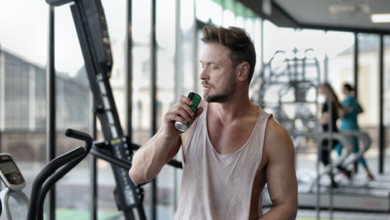A vitamin may already be a part of your daily routine, but you may be wondering about the best time to take multivitamins. If you exercise regularly, taking your supplement before working out may be beneficial. The info below sums up the benefits of a preworkout vitamin.
Best Time to Take Multivitamins
While there is no substitution for conditioning your body with regular exercise, taking a multivitamin before hitting the gym may help ensure you’re getting the most out of your workout. According to the Academy of Nutrition and Dietetics, many different vitamins are necessary to properly fuel your fitness routine.
vitamin B6 helps break down the macronutrients in food
For

example, vitamin B6 helps break down the macronutrients in food, like carbohydrates, into smaller units. These units are then used by your body for energy. Without these vitamins, you may not be able to keep up the activity level needed to complete an exercise.
Vitamin B12 supports the metabolic processes that help produce the energy you need to work out. Because the substance is found mostly in animal products, supplements may necessary for vegan or vegetarian athletes.
Vitamin A acts as an antioxidant and may help prevent muscle breakdown during endurance exercises. Therefore, it could be a valuable workout supplement. This is especially true for people looking to maintain a high level of effort for a long period, such as those running a marathon or going for a long swim.
Get Enough Vitamin C
One additional substance that is typically contained in many store-bought multivitamins is ascorbic acid, or vitamin C. While many people reach for it when attempting to ward off a cold, active individuals debating whether to take vitamins before or after a workout may be surprised to hear about its other potential benefits.
Helps to regulate insulin levels
Copper
As the third most abundant trace mineral in the body, copper helps protect the cardiovascular, nervous and skeletal system. It also strengthens the tendons needed to lift weights.
Good sources Peanuts, sardines in tomato sauce, crab, sunflower seeds
Magnesium
Found in the muscles, soft tissues and body fluids, magnesium plays a vital part in muscle contraction and helps to boost your energy levels. It can also reduce fatigue and muscle cramps.
Good sources Green leafy veg, garlic, seeds, nuts, bran
Riboflavin
Also known as vitamin B2, riboflavin aids the breakdown of protein, carbohydrates and fat, which are transformed into energy, and also supports the antioxidants in the body.
Drink Water Too!
Although water is not a vitamin, it is one of the most underrated necessities during your work out. Hydrating the body before, during, and after is key to overall results and health. Water replaces lost fluids during perspiration, regulates body temperature, and also lubricates the joints.
During exercise, your body uses oxygen to breakdown glucose for energy. When there isn’t enough oxygen in the body, you will produce a substance called lactic acid which is used in replace of oxygen to produce energy. The problem with lactic acid is that you can produce more in the bloodstream faster than the body can burn into energy. This then creates undesirable symptoms like muscle aches, burning, and stomach pain during your workout. Water is just as important as the workout itself. Carry a water bottle or two to the gym and stay hydrate!




